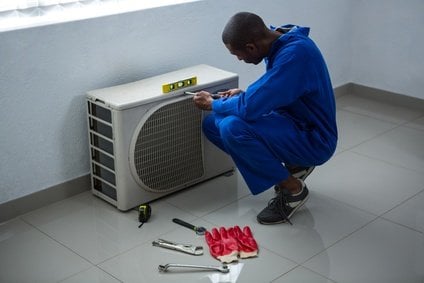The furnace and air conditioning system is a key component for any home. With an HVAC ( an abbreviation for Heating, Ventilating, and Air Conditioning), you have a system that will offer optimal thermal control as well as indoor comfort—just to make your life smooth and enjoyable. An HVAC system must be designed using the latest principles when it comes to heat transfer, thermodynamics, as well as fluid mechanics.

Cooling Systems
There are different types of air conditioners—each with unique features. They include:
Installation
A good number of cooling systems are easy and straightforward to install. The most popular types of these cooling systems include ductless mini-based split systems. However, interior components of cooling systems require some expertise when it comes to installation. That’s why you need to learn everything about your cooling system before purchasing one. Poor installations can lead to accidents like fires. Even worse, a poorly installed cooling system can lead to loss caused by system failure.
The System That Fits Your Home
The working principle of cooling systems isn’t the same. Depending on your home’s settings—you need a cooling system that suits your explicit needs. That’s why learning everything about your cooling system is extremely important. For instance, you need evaporative coolers if your home is in a drier climate. Evaporative coolers work by drawing air from outside and then passing it via water-saturated pads. The cool, moisture air then displaces the hot air—which makes the interiors cooler.
Heating Systems
Heating comes in different forms. Common types include:
Furnaces
According to a site like https://www.airnowhvac.com, furnaces work by burning materials to produce heat air via a duct tank. The heating air then replaces the cold air—making the interiors warm. Looking for a genuine HVAC system? Well, contact Furnace USA Heating & Air Conditioning for a genuine system. If you need furnace repair in Stillwater, OK, you may contact hvac companies like Sitton Mechanical.
Boilers
Boilers rely on steam radiators to heat water. Alternatively, they can use forced-water systems, electric heat, or heat pumps to heat water. This results in the generation of heated air, which replaces the cold air in a space to make it warm.
Radiators
Heating systems can also use radiators to produce heated air. Radiators—also know ass hydronic heating systems—use a pipe passing under the floor to supply heated air into any space. The tubes are flexible and are pre-filled with a solution of glycol. With this system, you have a heating solution that can heat any type of floor—including those made of concrete. Considered to be one of the most convenient ways of proving warmth to spaces, radiators can be fitted into wood flooring. However, the retro-fitting process must be meticulous and accurate so hiring professional heating services is necessary. Thus, as a homeowner, you need to learn everything regarding radiators before bringing them into your interiors.
Safety
Automation electrical appliances—especially the HAVC—can be dangerous to operate. For instance, an excessive power supply can damage the motors and even cause fires. Also, if you have kids, they might tamper with the electrical wiring—exposing you to electrocution risks. That’s why you should learn everything concerning your heating and cooling system before installing them in your home.
Maintenance
Any electrical system requires proper maintenance to serve you for years to come. And if you don’t know how that electrical machine works, proper maintenance is only going to remain a dream. For instance, if you don’t know a cooling or heating system works, maintaining it is not going to be that easy. That’s why you need to equip yourself with all the facts about your HACV system. With adequate knowledge, you are able to easily troubleshoot problems—a key step towards proper maintenance. For complex tasks such as furnace repairs, you may hire skilled HVAC technicians from companies like Valley Service.
Size
Don’t just purchase any heating or cooling condition for your home. The system you choose should be guided by size. The area to be cooled or warmed determines the size of the system you purchase. It’s also important to note that size is not measured in terms of size. It has to do with power rating. With proper power rating, you are able to achieve maximum efficiency. That’s why you must familiarize yourself with parameters such as power rating, energy consumption, and many more.
Model Efficiency
Normally, air conditioning units are available in 2 forms: standard-based efficiency and high-efficiency. With standard efficiency models, you have systems that can get the job done and are extremely affordable. However, these units are not that powerful when it comes to high demanding settings. On the other hand, high-efficiency units come with superior features and are costlier than their standard counterparts. High-efficiency models arm is powerful and can serve large spaces. So, before purchasing your HAVC system, it’s important to familiarize yourself with efficiency. Determine the model you need. Then go to your budget. Is it within your budget? Doing this ensures that you get an affordable system that can get the job done effectively.
Energy Management
Knowing everything about your HACV system is going to help you deal with those annoying and pilling energy bills. You will know how to inspect and fix leaks—an important step when it comes to minimizing energy costs. It will help you understand the basic functionality of your system.
The Bottom-Line
An HVAC system is one of the most important electrical components in any home. With this system, you don’t experience things like extreme cold or too much heat in your interiors. From cooling to a heating system, any home needs an HVAC system. However, before installing an HVAC system in your home, it’s important to learn everything about it. With adequate HVAC knowledge, things like installation, maintenance, and troubleshooting minor problems will be easy and straightforward. So, if you really care about your system, try learning everything about it. From working principle to maintenance best practices—having an in-depth understanding of your system will go a long way in prolonging its life.